Contents
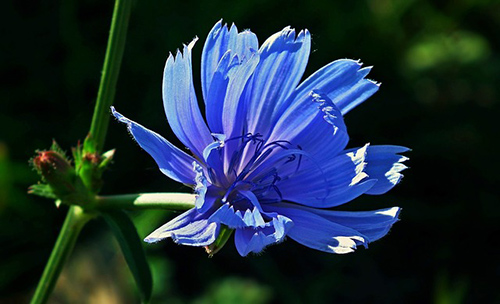
The chicory plant is a gift for people who love to walk. Until mid-summer roadsides retain the sky blue color of chicory flowers, contrasting with the golden landscape. The plant can hardly go unnoticed, even for people who have never heard about it. It seems to suggest, “Use me! Enjoy my properties!”
The chicory plant is one of the most beneficial plants known since, in addition to its extraordinary medicinal properties, it can pleasantly substitute coffee. In times of shortage, when expensive coffee cannot be bought, this humble plant can be used. It has not been highly appreciated, perhaps because it is abundant and cheap.
“Chicory,” some people say with nostalgia, “we drank it during the war when there was no coffee.” It is interesting to point out that, in this case, the substitute – chicory – is much better for you than the original product – coffee.
Chicory Plant Scientific Facts
- Other names: Succory, wild chicory, wild succory.
- French: Chicoree.
- Spanish: Achicoria.
- Environment: Common in roadsides, slopes, and dry soils, chicory usually grows in warm areas of Europe and America.
- Description: Herbaceous, vivacious plant of the Compositae family, with an upright stem that grows from 50 to 60 cm high. Its beautiful blue flowers have petals with five-pointed ends and close at night or when the weather is terrible. All parts of the plant, including its latex, have a bitter flavor.
- Parts of the plant used medicinally: Young leaves and roots.
Healing Properties and Indications
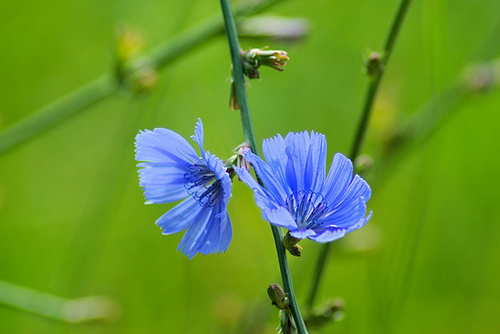
The chicory plant was already known and used by ancient Egyptians. Galen said of this plant that it was a “friend of the liver.” Both its roots and its leaves contain inulin and levulose, two sugars that promote liver functioning. However, most of its medicinal properties are caused by chicory’s bitter components, stimulating all digestive processes.
- In the stomach, it has eupeptic properties, increasing the production of gastric juice. Hence, it is helpful for bloated abdomens if one drinks a chicory infusion after meals instead of a teaspoonful of bicarbonate. Moreover, when taken before meals, it has powerful appetizer properties, giving an appetite to children and adults.
- In the liver, it promotes bile secretion (choleretic action), which is needed to digest fat. It also activates circulation and relieves liver congestion.
- Chicory also activates intestinal motility (laxative action). A cup of chicory infusion on an empty stomach helps combat intestinal laziness and constipation. It also has mild vermifuge properties, which help to expel intestinal parasites.
Therefore, the recommended uses of the chicory plant are as follows:
- Lack of appetite.
- Gastric atony.
- Bloated stomach.
- Biliary dyspepsia is caused by an impaired functioning of the gall bladder.
- Liver congestion.
- Portal hypertension.
- Constipation.
- Intestinal parasites.
Chicory also has mild diuretic and depurative properties; hence it is recommended for gout and arthritis.
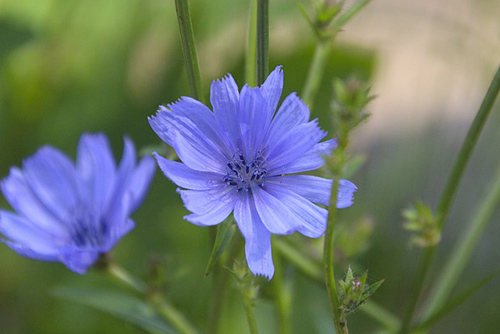
How to use Chicory
- Salads: Raw leaves of chicory, when cut before the plant blooms, have a pleasant, bitter flavor. Excellent wild plant salads are prepared with these leaves and dandelion and garlic, dressing the dish with lemon juice and olive oil.
- Fresh juice: People who want more powerful effects can drink fresh juice of chicory leaves, obtained by pressing them on a cloth or an electric blender. It has a bitter flavor, but it will encourage a strong appetite. For lack of appetite, half a glass is recommended before each meal.
- Infusion, with 30g of fresh leaves and root per liter of water. Drink two or three cups daily: as an appetizer before meals, and as a digestive, after meals. This infusion must not be sweetened to achieve the most benefit from its refreshing bitter flavor.
Endive and Escarole
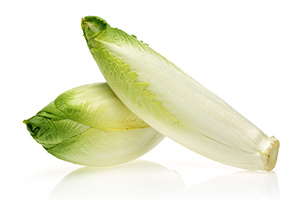
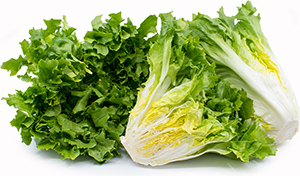
Endives and escaroles are cultivated vegetables of the same botanical family as the chicory plant. They have white leaves because they are farmed without sunlight. Hence, these plants lose many of their intrinsic medicinal properties and vitamins, especially vitamin A.
Chicory Coffee: Chicory root, gathered in the Fall, is then dried, toasted, and ground to obtain “chicory coffee.” It can be mixed with oat malt, which gives the infusion a more pleasant flavor.
DISCLAIMER: All content on this website is presented solely for educational and informational objectives. It would be best to not rely on the information provided as a replacement for advice, diagnosis, or treatment from a qualified medical expert. If you are pregnant, nursing, or have any preexisting medical concerns, you should talk to your doctor before using any herbal or natural medicines.
REFERENCES
- George D. Pamplona-Roger, M.D. “Encyclopedia of Medicinal Plants.” George D. Pamplona-Roger, M.D. Encyclopedia of Medicinal Plants. Ed. Francesc X. Gelabert. vols. 2 San Fernando de Henares: Editorial Safeliz, 2000. 440,441. Print. [chicory plant]
